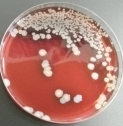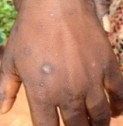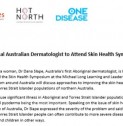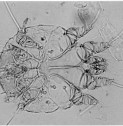Scabies is a parasitic infestation of the skin with the parasitic 'itch mite' Sarcoptes scabiei. The tiny mite burrows into the upper layers of the skin causing intensely itchy lesions which commonly become infected with bacteria. In humans, scabies is a particularly significant disease in children, but occurs in both sexes, at all ages, in all ethnic groups, and at all socioeconomic levels. Transmission of the mites from one person to the next is by direct skin to skin contact.
Scabies is a significant disease worldwide in humans, wildlife, livestock and domestic animals and is a particularly serious problem in many remote Australia Indigenous communities, where overcrowded living conditions are a major factor contributing to high rates of transmission.
Our research focus:
- To conduct community based treatment projects aimed at reducing the prevalence of skin infections
- To build capacity in local community workers in recognising and treating skin infections and in research methods
- To monitor for and investigate the molecular mechanisms of emerging drug resistance in scabies mites
- To investigate how scabies mites live and survive in the skin. Proteins which may be essential for mite survival could be targets for the design of alternative treatments for scabies
- To investigate how the infested person’s immune system responds to the scabies mites, and why some people’s immune systems react differently to the mites, resulting in severe infestation known as crusted scabies.
- We use an established laboratory test to determine the sensitivity of scabies mites collected from scabies patients, to current treatments. This enables us to assess the likely effectiveness of treatments used for individual crusted scabies patients, as well as monitor for the emergence of drug resistance in scabies mites.
Key staff:
Collaborators:
- Telethon Kids Institute
- Northern Territory Centre for Disease Control
- One Disease
- International Alliance for Control of Scabies (IACS)
- Queensland Institute of Medical Research, University of the Sunshine Coast
- Toward a scabies control strategy for northern Australia: Methods to map the burden of scabies and evaluation of a community-wide preventative chemotherapy strategy in two Indigenous communities
- STARFISH
- Phase II, randomized, double-blind, parallel group dose finding study of single oral doses of moxidectin in adults with scabies.
- Lacey JA, Marcato AJ, Chisholm RH, Campbell PT, Zachreson C, Price DJ, James TB, Morris JM, Gorrie CL, McDonald MI, Bowen AC, Giffard PM, Holt DC, Currie BJ, Carapetis JR, Andrews RM, Davies MR, Geard N, McVernon J, Tong SYC. Evaluating the role of asymptomatic throat carriage of Streptococcus pyogenes in impetigo transmission in remote Aboriginal communities in Northern Territory, Australia: a retrospective genomic analysis. Lancet Microbe 2023. doi:10.1016/S2666-5247(23)00068.
- Glennie M, Gardner K, Dowden M, Currie BJ. Active case detection methods for crusted scabies and leprosy: a systematic review. PLoS NTD 2021;15(7):e0009577. doi:10.1371/journal.pntd.0009577.
- Bernigaud C, Zakrzewski M, Taylor S, Swe PM, Papenfuss AT, Sriprakash KS, Holt D, Chosidow O, Currie BJ, Fischer K. First description of the composition and the functional capabilities of the skin microbial community accompanying severe scabies infestation in humans. Microorganisms 2021;9:907. doi:10.3390/microorganisms9050907.
- Hasan T, Krause VL, James C, Currie BJ. Crusted scabies; a 2-year prospective study from the Northern Territory of Australia. PLoS NTD 2020;14(12):e0008994. doi:10.1371/journal.pntd.0008994.
- May PJ, Tong SYC, Steer AC, Currie BJ, Andrews RM, Carapetis JR, Bowen AC. Treatment, prevention and public health management of impetigo, scabies, crusted scabies and fungal skin infections in endemic populations: a systematic review. Trop Med Internat Health 2019;24:280-293. doi: 10.1111/tmi.13198.
- Bowen AC, Carapetis JR, Currie BJ, Fowler V Jr, Chambers HF, Tong SYC. Sulfamethoxazole-trimethoprim (co-trimoxazole) for skin and soft tissue infections including impetigo, cellulitis and abscess. Open Forum Infect Dis 2017;4(4):ofx232. doi:10.1093/ofid/ofx232.
- Lynar S, Baird R, Currie BJ. Scabies and mortality. Lancet Infect Dis 2017;17:1234.
- Kearns TK, Speare R, Cheng AC, McCarthy J, Carapetis J, Holt D, Currie BJ, Page W, Shield J, Gundjirryirr R, Bundhula L, Mulholland E, Chatfield M, Andrews RM. Impact of an ivermectin mass drug administration on scabies prevalence in a remote Australian Aboriginal community. PloS Negl Trop Dis 2015;9(10):e0004151.doi:10.1371/journal.pntd.0004151.
- Currie BJ. Editorial: Scabies and global control of neglected tropical diseases. N Engl J Med 2015;373:2371-2372.
- Currie BJ, McCarthy JS. Permethrin and ivermectin for scabies. N Engl J Med 2010;362:717-722.
-

New drug could stave off scabies
A new trial has started in Darwin to see whether the drug Moxidectin can be used to treat scabies in a single dose.
-

Pill shows promise in eradication of scabies
Researchers are making progress in developing a single tablet to eliminate scabies. It is being trialed in the Northern Territory by a team from Menzies.
-

Skin disease a 'national crisis'
NT News report on the HOT NORTH One Disease Skin Symposium attend by Australia's first Indigenous dermatologist Larrakia woman Dr Dana Slape
-
First Aboriginal Australian Dermatologist to Attend Skin Health Symposium in Darwin
This week Larrakia woman, Dr Dana Slape, Australia's first Aboriginal dermatologist, is back home to country to attend a Skin Health Symposium
-

Bendigo Advertiser | Pain free staph fix given green light
Menzies School of Health Research (Menzies), findings show there has been inaccurate reporting of resistance to the recommended antibiotic, trimethoprim- sulfamethoxazole (Bactrim).
-

Pain free golden staph treatment cleared for use in remote communities
A northern Australian research team has provided reassuring support for the continued use of an oral treatment option for patients with skin infections, finding that there has been inaccurate reporting of resistance to the recommended antibiotic.
-
Menzies part of the Eureka Prize winning team
The Scabies Research Team, from Murdoch Childrens Research Institute; the Kirby Institute; St Vincent's Hospital Sydney; and Menzies School of Health Research, wins the 2017 Australian Infectious Diseases Research Centre Eureka Prize for Infectious Diseases Research.
-
AUSTRALIAN RESEARCHERS PLAY VITAL ROLE IN ADDRESSING THE GLOBAL SCABIES CRISIS
In a world-first study, treatment of a whole community with oral ivermectin has been shown to virtually eliminate scabies, providing new hope in the fight to control this debilitating disease.
-

Pioneering skin sores research to improve health of children globally
A NT-based research project investigating alternative and more practical treatments for skin sores is set to benefit the millions of children worldwide who suffer from this infection.
-

Scabies and strongyloides: a community snapshot
Researcher Therese Kearns tests a new treatment for mite and worm infections.
-

ABC stateline report - beating scabies and strongyloidiasis
The Menzies School of Health Research is hoping the drug Ivermectin will rid the Echo Island community, east of Darwin, of scabies and the strongyloides worm.



